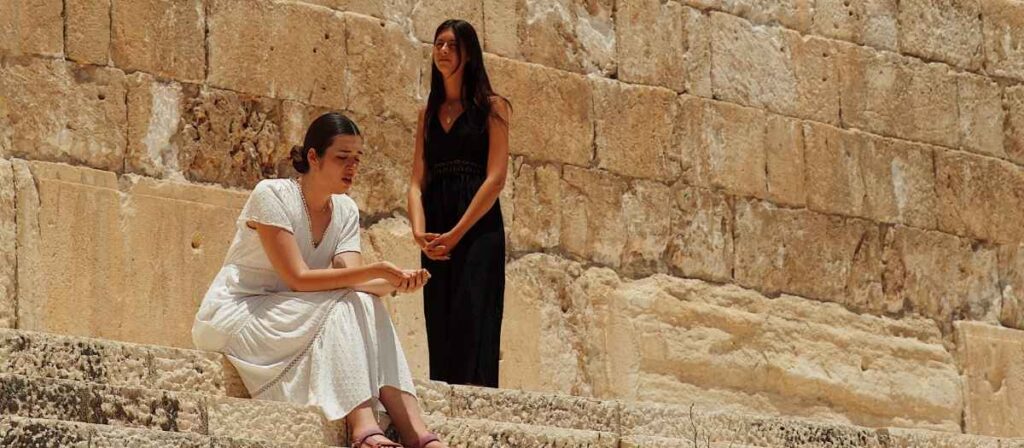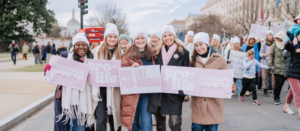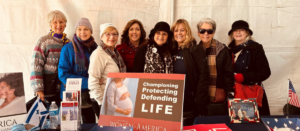Crack-crack-crack. My stomach dropped at the rapid staccato of gunfire, shocked by the realization of how near it sounded. I was four days into a trip to Israel as a Young Women for America Ambassador, and we were at the Gaza Envelope, the southern border zone between Gaza and Israel – an area with only 15 seconds of warning before potential rocket strikes. For the first time, the distant conflict I’d seen in headlines became real, frightening, and deeply personal.
That moment shifted my entire perspective on the Israeli-Palestinian conflict. I saw it no longer as an abstract dispute but as a deeply human tragedy – one filled with pain, resilience, and hope on both sides.
I saw the decimation of the land; I heard the blasts of explosions. I felt the squeeze of fear following the false alarm of a siren glitch. For the first time in my life, I encountered the sounds of war.
Gaza was demystified. It was no longer a social justice chant from twenty-something-year-olds wearing checkered scarves, holding signs, and screaming in the streets. It was no longer this sliver of overpopulated land overrun by terrorist militants thousands of miles away from me.
It was real, and it was directly in front of me.
In that moment, I became distinctly aware of the reality that there were innocent women and children there – people who were helpless and hungry, tired and terrorized by a cruel and inhumane terrorist proxy. All I could think about was how, after removing the complexities of war, we are all human. We were all God’s creation. In that moment, I felt both the Israeli and Palestinian pain – the longing for normalcy and peace.
“If there was one thing that you would like Americans to understand about Israeli culture, what would it be?”
I posed this question to Karen Levi, our brilliant Israeli guide, in Galilee days later. It was a calm day, watching the waves lap against the shore, and our appointed tour guide and medic agreed to lend me an hour of their time. As an American college student who was all too familiar with the discourse following the October 7th attacks and the ensuing war, I wanted to understand what the truth was. American opinions, I found, starkly contrasted Israeli-Palestinian realities.
Karen, an advocate for peace between Israelis and Palestinians, shared her thoughts: “I think that the people cherish life a lot, and we want to live in peace,” she said, “It’s much more multi-layered than what is seen. The culture is very rich – not in money, but in diversity. And we do care about the other side.”
Eliya Cohen, 22, a former infantry officer of the Israeli Defense Forces, echoed Levi’s sentiments when asked to share her thoughts on the October 7 massacre that sparked the current war: “I think we Israelis are used to tragedy. It was a deeply painful and challenging event that is still ongoing. I think we learn how to overcome pain as a community. And it’s true, we face death at a very young age. So it’s not that we don’t fear death, but I think we understand that we might die – so let’s enjoy life while we’re alive.”
As a Christian, I believe that complete peace and justice will be established when Christ returns. I hold fast to the Biblical truth: He will wipe away every tear from their eyes, and death shall be no more. But for now, we live in the present – and the present temperatures are boiling.
As a member of Generation Z and an active social media user, I’m no stranger to extreme and polarizing American social wars. I have witnessed protests on campus, engaged in conversations with people who believe that Israel is committing genocide in Gaza and that Hamas should use whatever means necessary to eliminate the “Israeli Occupation Forces from all of Palestine.” I have also seen clips of young international Jews vocalizing support for the death of Gazan children or “pranking” their parents by claiming they donated to Gazan humanitarian relief organizations. In my opinion, I don’t find any of it acceptable, moral, or right.
Sure, it’s easy to be radical when hiding behind a screen. It’s easy to say anything you feel when returning to a comfortable home in a quiet neighborhood with the assurance of a well-stocked fridge. The confidence that plans with friends will stand because no one is risking their lives in daily battle or running to shelter because of missile threats. And amidst our American comfort, the social temperature is rising – the rage, the division, the potential violence.
So, on a practical level, what can be done? We can begin by lowering the temperature in our spheres of influence – at school, in our communities, and in the public square – by engaging in balanced conversations and advocating for peace and justice. We can refrain from regurgitating extremist views like the genocidal cry “from the river to the sea,” the antisemitic propaganda that “all Jews are evil,” or the intellectually dishonest claim that “all Palestinians are Hamas.” We should seek to better understand the culture of the causes about which we are passionate.
And at the end of the day, we must remember to be human. When we choose to view those we disagree with as equal in value and find common ground, we can become peacemakers in our own communities.
*Ilona Bistrian is a YWA Ambassador at Texas A&M University






